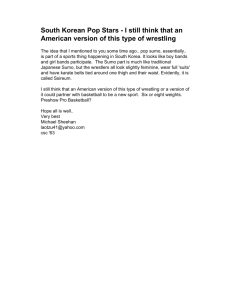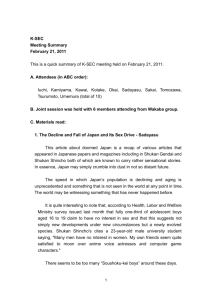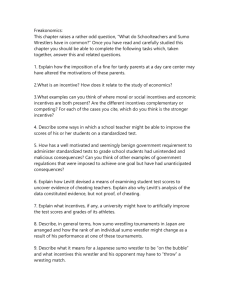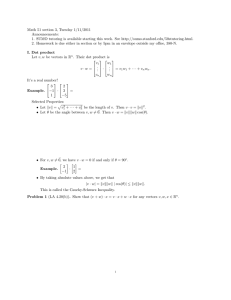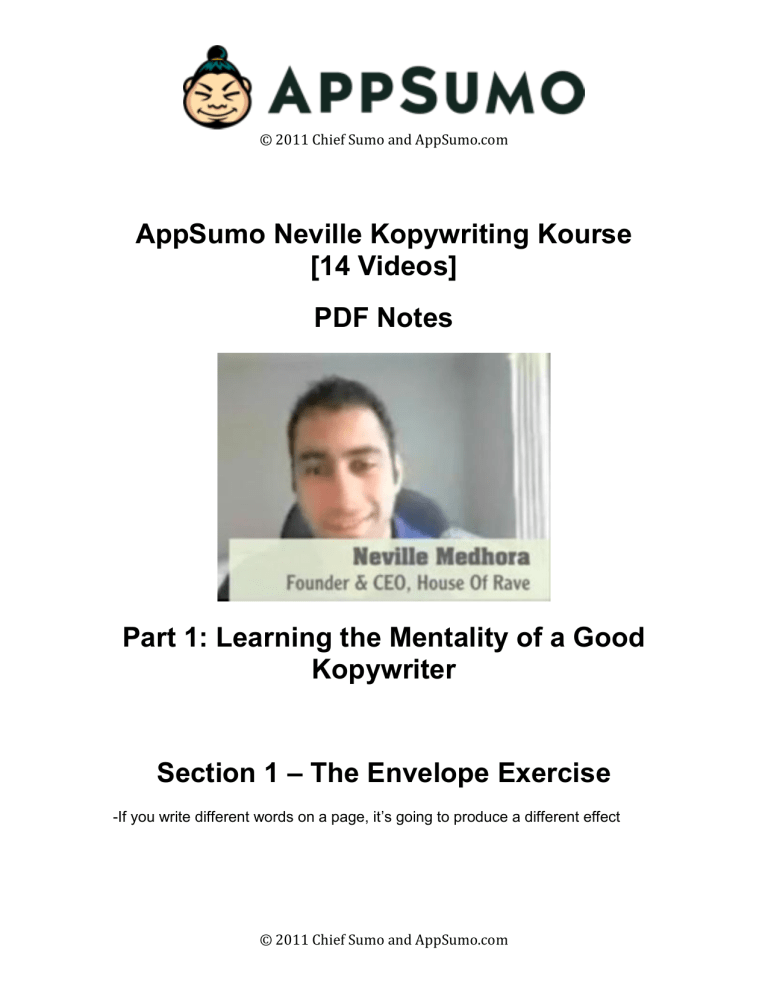
© 2011 Chief Sumo and AppSumo.com AppSumo Neville Kopywriting Kourse [14 Videos] PDF Notes Part 1: Learning the Mentality of a Good Kopywriter Section 1 – The Envelope Exercise -If you write different words on a page, it’s going to produce a different effect © 2011 Chief Sumo and AppSumo.com © 2011 Chief Sumo and AppSumo.com Section 2 – No One Cares About YOU. They Care About THEM -No one cares about you. People care about themselves -Example: “At XYZ company, we have a passion for wrinkle-free shirt, we…” more about their company history…it doesn’t matter. Rewrite it so that it relates to the person reading it (i.e. shirt wrinkles in the car when it’s hot) -The first thing you want to talk about is them. You want to get their attention, so talk about them, their problems, and what’s going on in their lives. Section 3 – Write Fun…Wacky…Casual -Although it might sound unprofessional, it’s funny, and people can relate. They don’t want to read boring copy, so make it interesting and engage them -Make it funny and engaging, but you also have to sell -Casual > professional lingo because it makes what you’re trying to say easy to understand -If you can’t write goofy, being casual is okay © 2011 Chief Sumo and AppSumo.com © 2011 Chief Sumo and AppSumo.com Section 4 – Not TOO Wacky -Be funny or casual, but at the same time stay relevant and clear. You don’t want to dilute your message to the point where customers have no idea what you’re trying to sell -Interweave your story with the product; use entertainment to get their attention, but always be selling! -A good question to ask yourself if you wrote something that’s too wacky is “is this adding to the users’ knowledge?” or “Am I helping them get through this by adding this in?” -Be ruthless in deleting copy that confuses people Section 5 – The All-Important AIDA Formula -Follow the AIDA formula when you want to sell something: A: Attention. Grab their attention. I: Interest. Interest them with interesting facts. D: Desire. Make them desire the thing. A: Action. Make them take action. -The more specific you are about leading them through every step, the better Section 6 – Make Your Customer “Bob” -Create an avatar of your average customer and put yourself in him/her shoes: How old are they? What’s their day like? Are they married with kids? Why are they coming to YOU for help? What exactly can you help them with the most? © 2011 Chief Sumo and AppSumo.com © 2011 Chief Sumo and AppSumo.com -What does your customer really want? Everything someone buys, they’re buying a solution to their problem -If you know everything about your customer, you can sell to them a lot easier (i.e. weight-loss sellers appeal to the emotional side of customers first to sell their product) Part 2: Learning the Technical Stuff Section 1: Style Elements -Make your copy style look like a newspaper editorial - keep the text width small (like ¾ of the page) so it’s easier to read -Use bolds, underlines, or caps if you want to emphasize something (but use it sparingly); center text to exaggerate something -Bold “P.S.” because people are drawn to it and you can spark people’s interest -Max 2-3 sentences per paragraph, using bullets to show lists of interesting things -Get people on a slippery slope; try to entice them with your attention-grabber. The whole point of the first line is to read the second line, and so on and so forth (i.e. “Ok, but that’s not the best part…”) Section 2: Subject Lines (3 Methods) -Subject lines are used to get your prospect’s attention. You need to grab their attention because it doesn’t matter unless they open it -If you already know your crowd, use the creative method (i.e. Subject Line: “Flash is dead. HTML5 is killing it.” For AppSumo customers) -“Heard it off the street method”: Example: © 2011 Chief Sumo and AppSumo.com © 2011 Chief Sumo and AppSumo.com Step 1.) Make a chart like this on a piece of paper: Something you heard on street What you're selling or proposing Step 2.) Under the "Something you heard" section, brainstorm some things that if you heard them passing someone on the sidewalk, you'd stop and go "Errrgghh!!??" Examples: I dropped $700 like 10 feet from here.... My dog shat out a $100 bill today.... Step 3.) Under the "What you're selling" section, write what you're selling. Example we'll use: Selling an HTML5 programming course Step 4.) Take the best lines, and pair them together: Something you heard What you're selling I dropped $700 like 10 feet from here.... HTML5 My dog shat out a $100 bill today.... HTML5 Step 5.) Combine them together to make mini-stories: I dropped $700 like 10 feet from here today, but that’s okay because I made it back with a project using HTML5 Step 6.) Use your new-found "catchy-mini-stories" as either subject lines or opener lines to get people's attention. -The Digg Method (Neville suggests this): go to Digg.com Search “HTML5” Sort by “most dugg” to see which subject line is best © 2011 Chief Sumo and AppSumo.com © 2011 Chief Sumo and AppSumo.com Section 3: Short Copy vs. Long Copy? -Long copy is better than short copy. Not because it’s longer, but because you have a lot to say and your customer is the right customer -Two reasons why people won’t read long copy: 1) You’re boring, 2) They’re not interested in what you’re trying to say -Don’t go long for long sake, say what you need to say briefly, just don’t fluff it up Section 4: Let’s Write a Real Letter! -Neville uses Google docs, creates a new document and then writes out four subject lines (12 pt Arial), and create a table (550px wide) and fill out AIDA Check his video page for his exact copy Section 5: A Real Life Example (STEM) -Refer to video/site to see Neville’s exact copy -Take 10 steps back and look at your copy, if you can’t figure out what you’re supposed to do in one second…then you have failed -Immediately tell the customer what you can offer them; relate to them and don’t bury your lead (i.e. Subject line: “Stem is now live! 20% off Launch Coupon” or “Here’s how to close a sale with Stem”) -You overestimate the amount of people who think that you’re not professional enough; regardless of what they think, you still got them to read/click through © 2011 Chief Sumo and AppSumo.com © 2011 Chief Sumo and AppSumo.com Section 6: Another Real Life Example (Online Personal Trainer) -When you’re reaching out to someone, don’t talk about YOU talk about them; you have to get their attention because you got to get them to read it firstly. Offer them something irresistible – stop “pimping” your product right away Section 7: OK Smarty, But What If My Company Doesn’t Let Me “Write Funny” -Use AIDA to structure your message, put yourself in the customer’s shoes and use casual copy to relate to them (see video for exact copy) © 2011 Chief Sumo and AppSumo.com © 2011 Chief Sumo and AppSumo.com Resources: -Gary Halbert Letters (Free): http://thegaryhalbertletter.com/ (start with Boron Letters) -Advertising Secrets of the Written Word by Joseph Sugarman -Ogilvy on Advertising by David Ogilvy -Breakthrough Advertising by Eugene Schwartz (pricey) Copy Checklist: Did you write something Did you follow AIDA format? Did you make sure to make the letter more about THEM? If it's a new or difficult product for the audience, did you educate the customer on how they could get lots of benefit out of it? Did you make sure to explain to them EXACTLY HOW to take action? If you step 10 feet away from your computer, can you easily tell what action to take? Sumo Insider What do you want to learn next? Just send an email to nextactionvideo@appsumo.com © 2011 Chief Sumo and AppSumo.com
